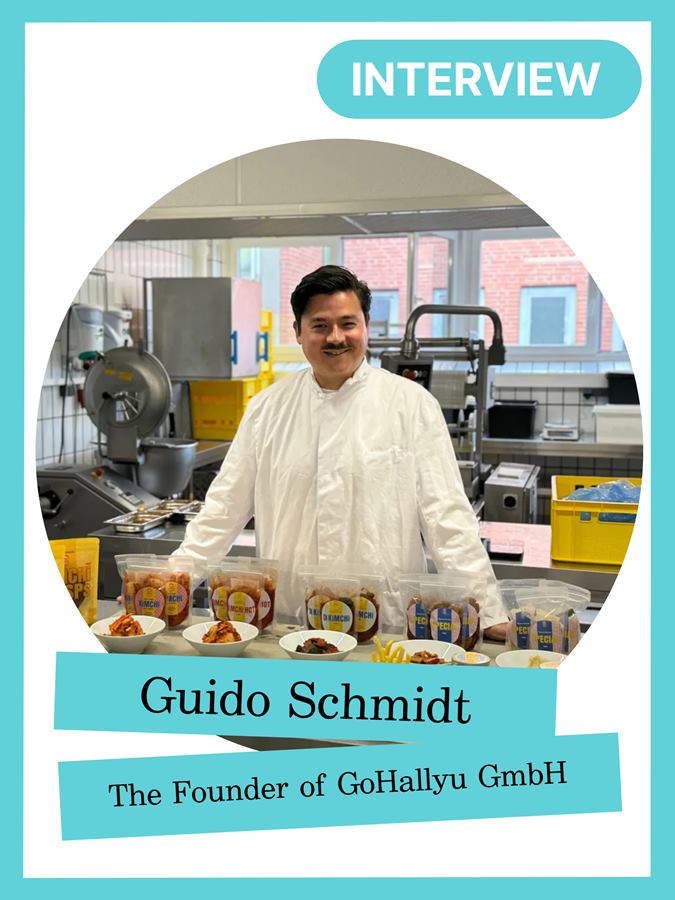Daily Busan
`Be brave enough to try something new or different`

Busan is Good recently visited Hamburg, Busan's friendship city. There, in the heart of Germany's northern harbor city, we discovered a delightful surprise: a kimchi production facility.
We met Mr. Guido Schmidt, founder of the impressive food company GoHallyu GmbH, and he shared the story behind his brand, "THATs KiMCHi." Inspired by his Korean mother's unique recipe, Mr. Schmidt has successfully introduced this iconic Korean food to the German market. His company now offers a variety of kimchi-related products for both corporate and individual customers, including dried kimchi chips, kimchi mayo and kimchi-infused salt.
In this interview, Mr. Schmidt shared his journey of bringing a beloved Korean flavor to Hamburg and how his unique idea turned into a growing business.
Q. Could you introduce yourself and your business?
I'm Guido Schmidt, and this is my wife Annaria. Our company name is "GoHallyu," and our brand name is "THATs KiMCHi." We started THATs KiMCHi at the end of 2023. We produce kimchi in Hamburg using my mother's recipe. My mom is Korean, so we make original Korean kimchi.
Q. What brought you to live in Busan?
Before launching my Kimchi business, I worked at Airbus, a leading aircraft manufacturer, for 12 years. I was stationed in Busan to help facilitate communication between Airbus and our Korean partners.
I lived in Haeundae for almost four years, commuting daily to Gimhae International Airport, which meant travelling across the entire city from east to west.
My first daughter was also born in Busan in 2015, so I would say our family has a strong connection to the city.
Q. How was your experience living in Busan? What impressions did you have?
Busan is a vibrant city, full of beautiful sunlight and energy. The ocean surrounding it keeps the summers cooler than in many other parts of Korea.
What I really loved was the accessibility to nature. I could enjoy outdoor activities in Haeundae, where I lived, without traveling far. I just laced up my hiking boots and headed to the nearby mountains. Living so close to the sea was also a wonderful experience. The mix of natural beauty and the modern architecture is precisely what comes to mind when you think of Busan. In many ways, it reminded me of Hamburg, my hometown.
Q. Why did you decide to start a kimchi business in Hamburg?
After my time in Busan, I relocated to Montreal, Canada, for a new position. My family and I lived there for 3 years, and during that time, I started to feel the urge to try something new.
Once the idea took hold, I knew I shouldn't keep putting it off; otherwise, the opportunity might slip away.
Our family also felt the need to settle down somewhere. After many conversations with my wife, we explored franchising Korean food and jumped right in. We started with kimbap, but eventually expanded into kimchi, inspired by the popularity of our kimchi kimbap. That's how the business evolved.
Q. Busan is promoting itself as a city where young people can live and thrive. I've heard that Hamburg has a high rate of youth entrepreneurship. Based on your experience, why do you think that is the case?
The infrastructure in Germany is different from that in Korea. In Korea, everything is centered in Seoul. Seoul is so much bigger than all the other cities.
But in Germany, it's divided. Berlin is big, but Hamburg is also big. Other big cities like Munich, Frankfurt and other cities have different specialties. So, I think there's more competition between the cities to be more attractive to young entrepreneurs. It's a good thing when cities compete for young talent.
In Hamburg, people can rent spaces, like for an office or a small kitchen, where they can try things. Plus, there is a harbor, like in Busan, so there is good infrastructure for trade and logistics and lots of diversity.
I think these are the factors behind Hamburg's high rate of youth entrepreneurship.
Q. As someone who lived in Busan, what areas do you think Busan should focus on to support young entrepreneurs better?
In my view, the most crucial foundation for starting a business is access to the right space. So first, the city should actively provide proper facilities, such as shared kitchens and co-working spaces. These facilities can significantly ease the financial pressure on young entrepreneurs in the early stages. Once they have a dedicated space, they can better focus and nurture their ideas in a more concentrated, collaborative environment.
I also recommend organizing idea competitions for young entrepreneurs. These events allow participants to gain inspiration from one another and grow through the process itself, which ultimately leads to sharper, more developed ideas.
Q. What advice would you give someone wanting to start a business in Busan or Hamburg?
Believe in your ideas, but also trust in the value of feedback and the importance of taking practical steps forward. Starting a business is all about expressing creativity. Keep refining your ideas and always aim to move one step ahead of where you were yesterday, because there's always room for improvement. And sometimes, real growth requires boldness. Be brave enough to try something new or different. That's how you improve and make your business stand out.
<Today's Vocabulary - 오늘의 단어>
harbor: 항구 production: 생산 facility: 시설 impressive: 인상적인 aircraft: 항공기 manufacturer: 제조업체 station: 자리하다 commute: 통근하다 vibrant: 활기찬 accessibility: 접근성 lace up: 끈을 묶다 relocate: 이주하다 divided: 분리된 specialty: 강점 logistic: 물류 entrepreneur: 사업가 ultimately: 궁극적으로 stand out: 눈에 띄는
Editor: Song Soomi
Copy Editors: Ryu Hyoseung, Anton J. Mapoy

